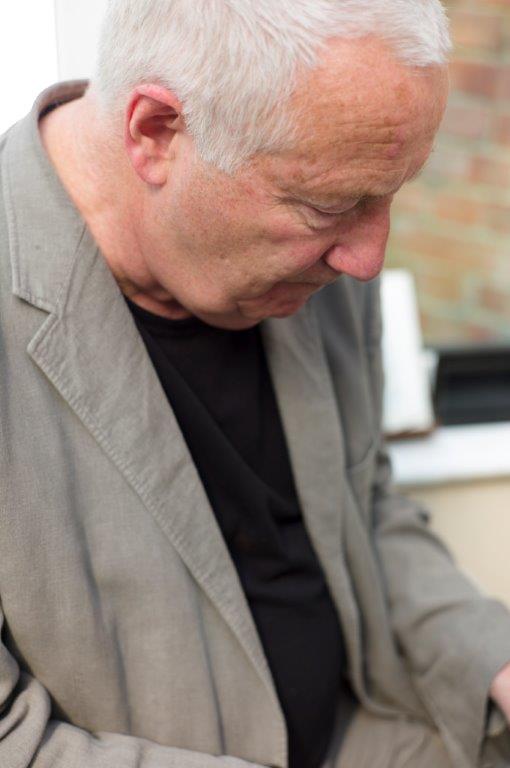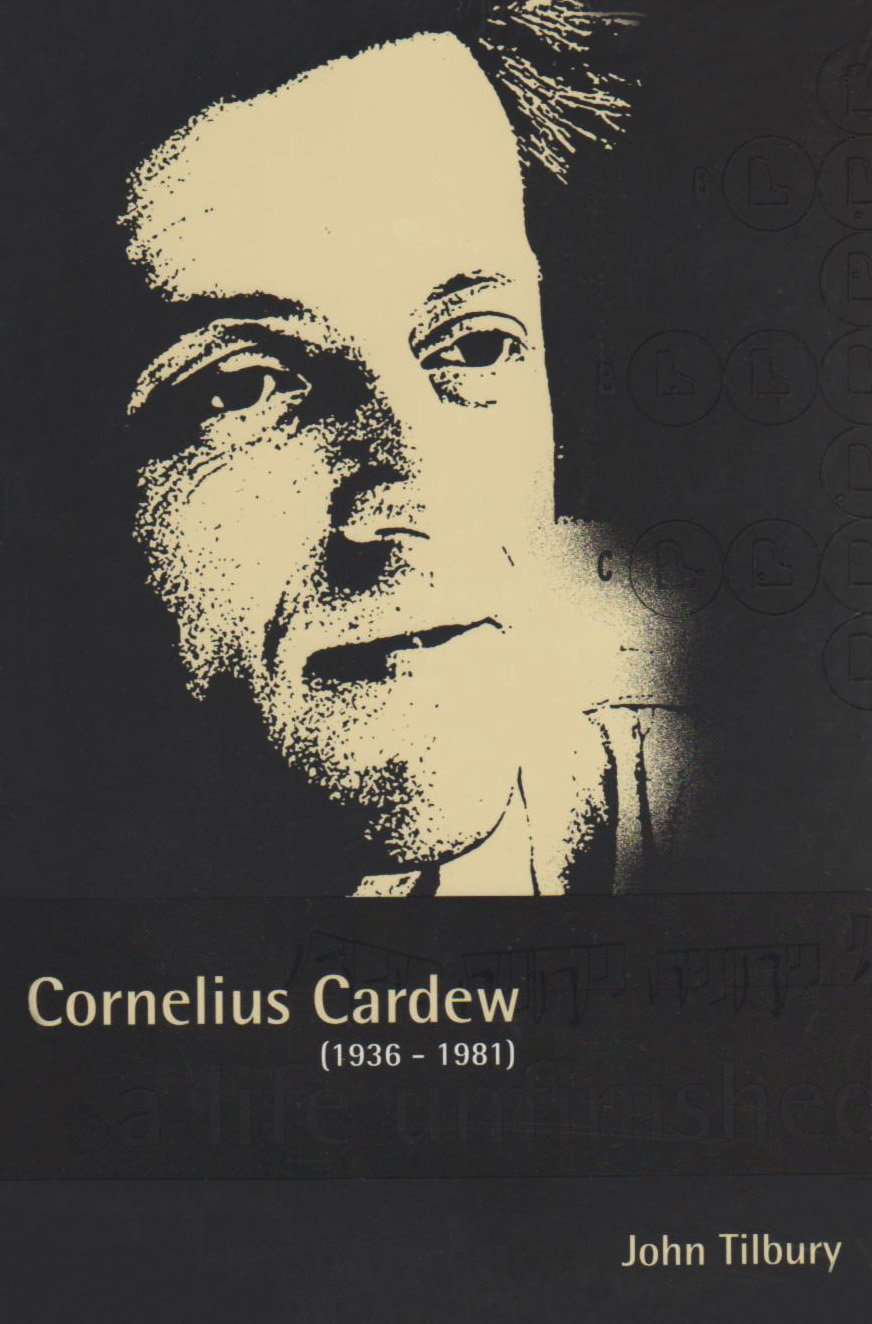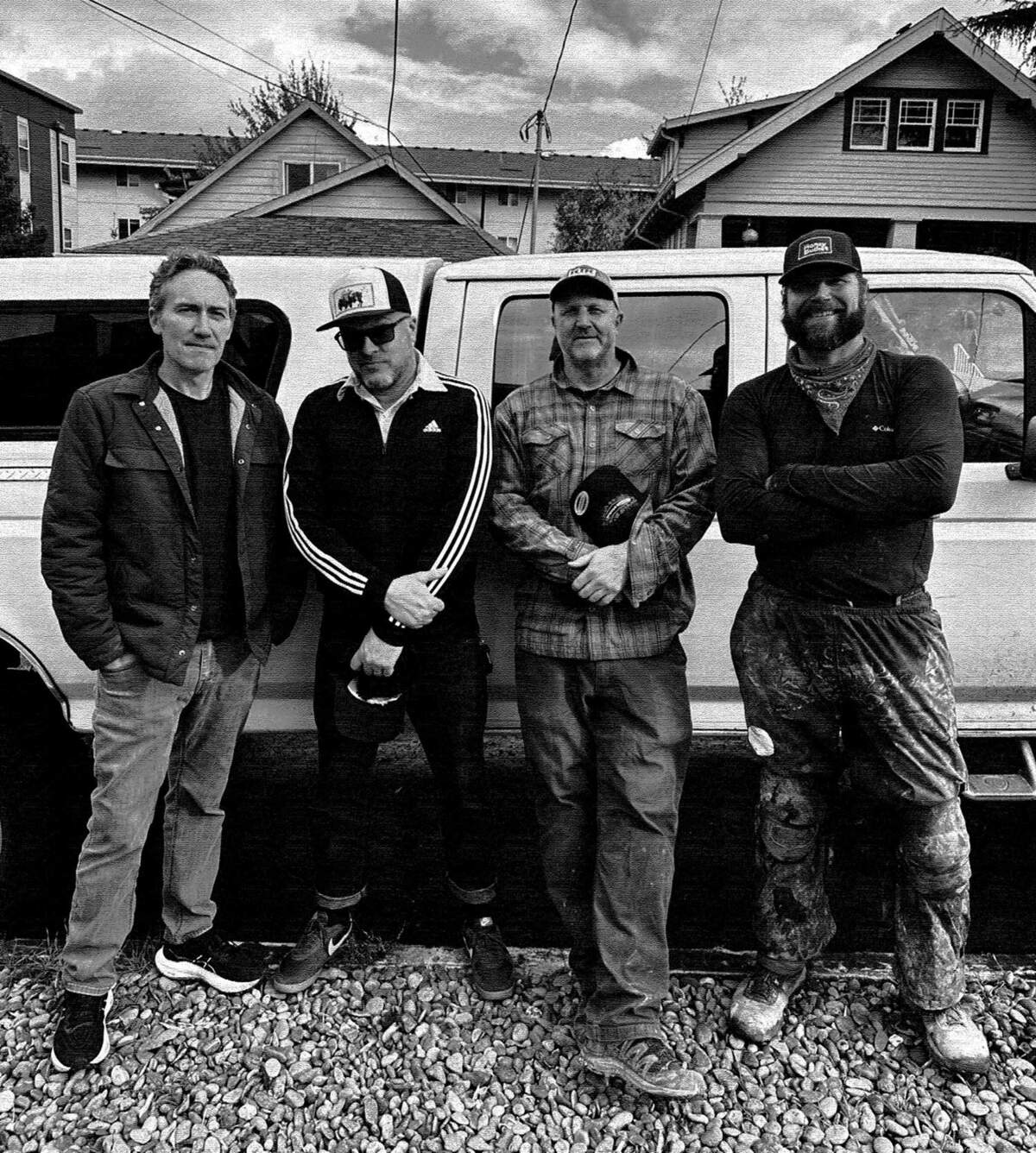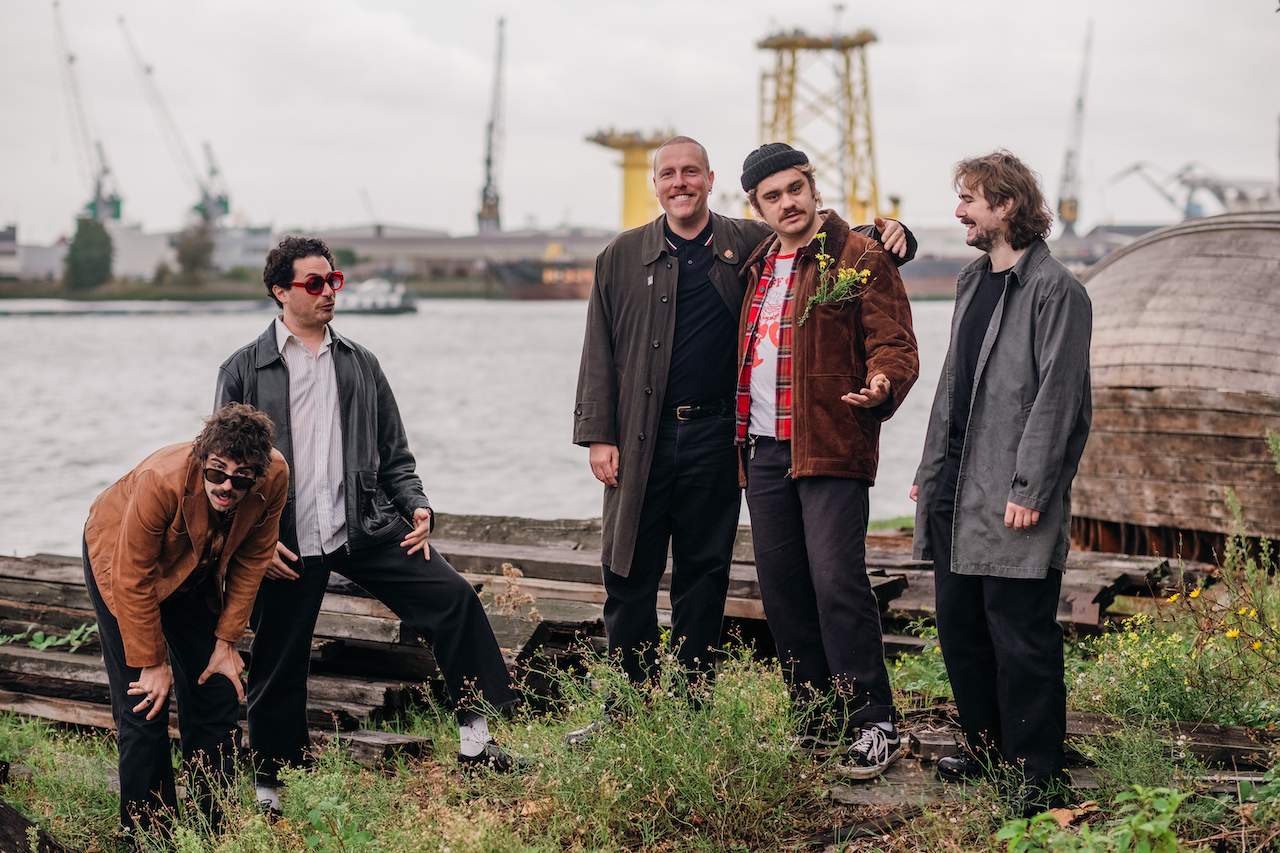Interview with John Tilbury
John Tilbury is renowned for his interpretation of the piano music of Morton Feldman, John Cage, Christian Wolff and Howard Skempton. Tilbury played with Cornelius Cardew in improvisation groups the Scratch Orchestra and AMM.
To begin with, when and where were you born? Was music a big part of your life in Tilbury household?
I was born in London on February 1st 1936. It wasn’t until the war began in 1939 that my parents found somewhere semi-permanent to live. We shared a small house in a London suburb with my mother’s sister and her family. My parents and I shared 2 rooms, one of which was their bedroom. I lived, ate and drank, listened to the radio, played the piano, slept, in the other room. The chair I ate my meals from also served as a bed. That situation remained for 18 years, i.e. long after the war was over. When my Dad came home after 4 years with the British army in Egypt I recall his playing some hymns on the piano. Inexplicably, I was sobbing. (The piano came from someone in the Tilbury family – I don’t know from whom).
Was there a moment in your childhood when music seemed to catch a special interest in you?
The war dominated my developing consciousness (3-9) . Although England did not suffer the humiliation of occupation, the bombing was extensive and devastating, especially in the cities. During the Blitz my mother and her sister, their mother, and my cousin Angela would share a Morrison shelter, a kind of large metal table under which we, the five of us, slept side by side.We would listen for the V1 and V2 pilotless planes which would drop out of the skies randomly (early examples of terror bombing). Music? There was a piano – nobody played it – it was simply a piece of furniture. We would listen to the radio, especially ‘workers playtime’ where we would listen to factory workers singing; the munitions factory workers sang one of my favourites, ‘Praise the Lord and pass the ammunition’. At home listening to the radio we would all join in.
There was a lot of displacement, travel. I remember being on the back of an open lorry with our family with bits of furniture going somewhere. I never knew why or where. For the last couple of years we were evacuated to Torquay, in the south-west, by the sea. My mother and her sister would often mention ‘Peacetime’. My cousin and I used to wonder what that was. One day we heard a man on the radio (Winston Churchill) telling us that the war was over. Quite spontaneously, in every town, every village, people began partying joyously. So this was ‘Peace Time’! My cousin and I were instant converts!
Was piano your first instrument or did you also play any other instruments?
After the war, returning to London, the same house with piano intact, my parents decided it would be good for me to have piano lessons and there was a piano teacher nearby. My father had no profession as such; on his demobilisation from the army he got a job as a clerk. My mother was a shop assistant in a big store in Wembley where she sold baby linen. As a piano pupil I was to stay with Dorothy Symes, my teacher, until I was 18 and went to the Royal College of Music. In fact, my father played the piano a bit, with a rather limited repertoire of two pieces: the primo part of a duet by Wilhelm Ganz, Qui Vive, and the opening of Rachmaninoff’s C# minor prelude. The Labour Government had won the election and had introduced free education and free health. The consequences, although mainly positive, varied considerably. For example, when the British government asked the US for financial aid to help rebuild our cities, they refused, citing the British Labour Government’s free education and free health policies as evidence of Communism! Be that as it may, my parents could not possibly have afforded either the medical prescriptions or the school fees. N.B. Finally the US granted us a loan, at interest, of course. It was finally paid off in 2005. The mainstream media did not mention it, except the Guardian, who gave it two or three lines hidden away in the middle pages.
What was the main influence that led this decision towards music making.
It was practical. Why have a piano which nobody plays? I was the obvious choice and quickly showed an aptitude for it.
What are some of the most important albums you were inspired by?
There were no ‘albums’ when I was growing up – just individual 78s. In any case we did not have a record player. I listened to music on the wireless, whatever happened to be broadcast: there were Light (classical) Orchestras, the most famous of which was the so-called Palm Court Orchestra. There was a two-piano Duo (originally from Hungary, I think, Rawicz and Landauer), an Australian pianist, Eileen Joyce, who specialised in the Greig piano concerto. She also achieved fame by changing her ‘costume’ (backstage, of course) between pieces. And there were singers – this was before the advent of ‘pop music’: a duo, Anne Ziegler and Webster Booth, George Formby, an entertainer who sang risque songs and accompanied himself on the ukelele. He was a virtuoso on the ukelele. Vera Lynn, the ‘Forces sweetheart’ was very popular; she used to sing for the soldiers during the war. Ann Shelton was another popular singer. And there were many others. This was the immediate post-war popular music.
As I grew older, through Mrs Symes, who also taught Rick Wakeman, I was introduced to the classics, mainly piano music: Benno Moiseivitch, Myra Hess, Solomon were the London-based pianists. I took a particular liking to the Romanian pianist, Dinu Lipatti. Mrs Symes had recordings and his playing of the Bach Partita No1 made a huge impression on me, as did his playing of Chopin’s Barcarolle. For the first time I learned to listen ‘critically’. In the Gigue of the Partita there is a sequence which consists of a long diminuendo . Before he had finished the sequence Lipatti had reached an extraordinary level of ppp. But he managed to finish the sequence, somehow, at an even lower dynamic level, which was quite miraculous. A friend of my father managed to get tickets for Lipatti’s London recital. The tickets were returned; Lipatti was ill and 3 weeks later, 33 years old, he died. Lipatti was, and still is, my hero.

“Cardew phoned me and asked me if I would like to play a two piano concert of avant-garde music with him.”
How did you first encounter Cornelius Cardew?
I think it was in 1959 at the Dartington Summer School in Devon. Luigi Nono, whom he knew, was there, along with a few other young British musicians. I hung out with them, at a discrete distance.
When I returned to London Cardew phoned me and asked me if I would like to play a two piano concert of avant-garde music with him. I was surprised. He hardly knew me; in fact, I don’t think he had even heard me play. See Biography, p82
Anyway, we remained close friends and musical colleagues until his death.
You were a member of the Scratch Orchestra. Would you like to discuss Cornelius Cardew and the Scratch Orchestra?
This would take too long. If you read my biography of Cardew it is all there: extensively, in 4 chapters.
Was it through Cornelius Cardew that you involved with AMM?
Not really. Perhaps indirectly. Keith and Eddie invited me to join AMM in, I think, 1980, when Cornelius finally abandoned AMM. They could tell you more.
Did you all have the same philosophy behind the idea of exploring the music boundaries?
Not the same. But we share and explore our ideas, mainly through our mutual music-making. Eddie has written several books dealing extensively with our music. And not only our music.
“Improvisation thrives on chance, risk, the accidental, the unintended, all of which totally subverts any idea of ‘perfectibility’.”
Would you like to comment your piano technique? Give us some insights on developing your technique. How would you define ‘improvisation’?
In an interview with me a few years ago, a music journalist posed the following questions:
You’re sitting at the piano bench readying yourself to play. The audience is hushed; there’s an air of anticipation. Your fingers are poised over the keyboard. At that critical moment, do the mental processes you go through differ according to whether you’re about to play a composition or an improvisation? If so, in what ways are they different?
I answered as follows:
There are no hard and fast contrasts. Both modes are subject to constraints, imposed from without, which determine what and how one plays. Playing the score…of course, the notation prescribes the broad limits: whereabouts on the keyboard, a relative pitch, a relative duration, a relative dynamic (sometimes)… [But contingencies such as tuning and timbre, for example,] depend upon the instrument, the tuner, the room temperature, etc.[i]
So, with regards to a composition, if the hands are poised and the muscles tensed, this state of bodily affairs is only partially determined by information gleaned by the player from the score. Playing solo (from the score), one should not underestimate the leeway enjoyed by the performer: deciding the actual moment of execution from the moment of sitting down at the instrument. Compare this with playing under the control of a conductor’s baton, which is, perhaps, why a number of reputable solo pianists are indifferent concerto players.
The leeway in free improvisation is greater; one can wait until the music is already underway, has established itself, thanks to the initiative of the other players. But here, too, the first sounds of a set may come as a response to an external provocation – perhaps, though not necessarily, less specific than a musical notation. But what if you are playing solo? Your audience are strangers (initially) and the stage is a lonely place. Either the ambience assumes greater responsibility or, conversely, you retreat into your own private world, relying on recourse to subjectivity to provide reasons for breaking the silence.
In free improvisation the player revels in a whirlpool of uncertain potentiality. Each musical moment, however fleeting, presents a situation, a ‘problem’, to negotiate spontaneously. The decision to stop a note, or continue it, for example, is not determined by an external constraint – by compositional structure, by the score. There may be a physical reason for doing one thing or the other, like a wind player running out of breath, for example, but a spontaneous musical reason, is an ever-present option for the improvising musician, an option which always falls well short of ‘perfection’. When I improvise, and if the music has ‘taken off’, there is a strong feeling of identification with the sounds I make and hear.
Of course, in performing a composition, the composer/score must always prevail; in the last analysis the reader/performer does as he/she is told, although the need or desirability for compromise is something the composer/interpreter relationship often has to come to terms with. (Performer conviction is essential, even overriding, within reason, the composer’s initial prescription. I know that most composers would bow to this.) Yet more and more, I question the authenticity, the prestige of the written score and its traditional eminence. ‘Tradition’ – a relation with the past that is used to excuse all manner of gross and bestial acts, from pushing a head into a birthday cake, to stoning an adulteress.
I have been listening to an AMM CD, Fine, to a track which ‘features’ the piano.[ii] I have chosen this particular track because I want to try and verbalise what it means, at least for me, to be an improvising musician, and the questions and doubts it gives rise to. Generally, in performance the piano sound can be effectively subsumed into the context; different degrees of presence, from the soloistic, the palpable, as in the following example, to a situation where its contribution is barely perceived, but none the less telling – overheard rather than heard, working in the nooks and crannies, fleetingly emerging from time to time. In this extract, Phase 1 begins with a high-pitched continuo against which there are brief piano interjections: consonant, benign, including perfect intervals. Suddenly a dissonant, augmented interval is sounded, immediately leavened by a quiet repetition. Phase 2: the indeterminate continuo changes subtly, accompanied by an expressive sequence of piano semi-tones which stops for about twenty seconds.
Phase 3: restarts; adjacent notes are added to the semitones, creating clusters; a slight feeling of urgency, louder, quicker, insistent. A plateau is reached, then two steps descent. Stop.
There is no score, no blueprint, no ideal by which to stand or fall; the music is completely self-contained. It feels, to me, ‘right’ – not in any way ‘contrived’. It is as if the music was autonomous, and I were simply tracking it, letting it happen or unfold. Yet these are all split-second, ‘spontaneous’ decisions/choices. To what extent is what I play, and what I hear and see, influenced by my fellow musicians, or the audience? My preference is that the influence is subliminal, the relationships subtle and unfathomable. And chance? Not every sound has the same measure of intentionality. Accidentalness also plays a role, when intention is thwarted. Here is Cardew’s view: The only criterion for a sound is: ‘was the player expecting (intending) to make it? If not, it was a mistake, and makes a different sort of claim to beauty. As a mistake, it comes under criteria for action: mistakes are the only truly spontaneous actions we are capable of.'[iii] Imperfection reigns.
Going back to the original question, playing the score/improvising, ‘in what ways are they different’ – we can draw an interesting comparison in the preceding example between composition and improvisation. In the improvisation we can identify a real, as opposed to a prescribed, tentativeness; the musicians’ hesitations reflect this idea of ‘feeling a way into the music’. There is a fragility, a vulnerability, about the music. Compare this with the prescription ‘zögernd’ (‘hesitating’) in Schönberg’s op.19 no.1. Here the pianist may not perform the phrase in question ‘hesitatingly’, as the improvisers do; rather they should create, for the listener, the appropriate artistic expression of the concept of ‘hesitation’. Similarly, at the beginning of Debussy’s piano piece Jimbo’s Lullaby from the Children’s Corner Suite, the composer prescribes the performance instruction ‘gauche’. Of course, the pianist should not perform in a ‘gauche’ manner; rather they must express a certain awkwardness – through a subtle rhythmicization, through an idiosyncratic accentuation, and so forth. Through, paradoxically, control. (I am often asked how playing Feldman has influenced the way I improvise with AMM. In fact, it is the other way round. Through AMM I became more aware of the unintended in the sounds which abound in performances of Feldman’s music).
In improvisation there can be moments of real musical ‘awkwardness’; you are feeling your way; you are not sure whether you are making the right decisions, especially in the early stages. You are neither ‘convinced’ nor ‘convincing’. But this lack of conviction, too, can be contextualised and turned to musical, artistic advantage.
Sometimes, when I play a larger aggregate of notes, I can anticipate the qualities of sound and the nature of the harmony that I’m playing, but not exactly. I don’t exactly hear the chord in my head, except to the extent that it’s a cluster-type chord or a whole-tone type of chord. But once I’ve played it, then immediately I’m reacting and adjusting, trying various transpositions, for example. I like the economy of that way of working – the experimental part of it, working on the material, making split-second choices, ironing out the imperfections, or the perfections; retrospectively ‘correcting’ mistakes, using the piano as a sound source to be explored rather than an instrument to be performed on. It’s like pottery: you are dealing with a piece of clay, kneading with your fingers and hands, moving it around, making shapes, not dissimilar to that of sculpting in stone, the only artform that creates by reducing its material. It is the physicality of playing the piano that I enjoy so much.
When you are dealing with intervals and individual tones there’s more control. I’m playing a descending scale, for example, and I omit a few notes because I think at that particular moment I want a certain intervallic quality. And I know how to do that. Of late, I have got into playing scales and arpeggios. I like using scales, traditional scales, as well as idiosyncratic, ‘composed’ scales (reminding me of Cardew’s request in Paragraph 3 of The Great Learning, that the performer should ‘invent’ scales.) And, what is more challenging, I try to remember what I have played, what tones, what intervals. Sometimes, intentionally or unintentionally, I alter the intervals slightly. Sometimes I use preparations, not to bring about a complete metamorphosis of the instrument, but a way of subtly colouring a chord of say seven or eight notes by including a single ‘prepared’ tone.
But still one asks: how do we arrive at these ‘imperfect’ decisions – what determines these particular choices? Which pitches and when precisely to play them? Register? Durations? Repetitions? Pacing? Placement? The change from consonance to dissonance? The mood? The subtle inflections of intensity and dynamic? The morphology of a phrase? These decisions demand an alertness, a high level of consciousness; their execution requires precision, and a total commitment to an exact moment of execution. Yet nobody or nothing is telling me what to do. So whence these impulses? Cardew used to talk of musicalness, which went beyond mere musicality; his radical mission was to recognise the musical composition of the world, no less. Cardew questioned the existence of a separate, non-musical world. ‘My attitude’, he wrote, ‘is that the musical and the real worlds are one’.[iv]
In making these aforementioned ‘choices’ Cardew would allow his ‘musicalness’ to intervene, to assert itself – so the dilemma of ‘how many’ or ‘how much’ was not an exclusively ‘musical’ choice. He never seemed to prioritize in the way that most of us do. The reason for this was that for him every activity was endowed with equal significance. Devising a new musical notation demanded the same care, the same attention to detail, the same concern and respect for human relations, as bathing the baby or preparing a picnic.[v] The plot thickens.
The sound of the piano is magic and seems to transcend the instrument whence it materialises. It is a kind of Pandora’s Box; this is what intrigues me and which I try to exploit. The instrument carries with it an enormous amount of historical baggage. Every piano sound is steeped in history. So I walk a tightrope. I can fall into style; cliché, reference. The piano sound is subsumed into the context. Context is crucial. The appropriateness and inappropriateness of a piano phrase, chord, note, etc., relates to context. For example: ‘ugly’ sounds get beauty through their ‘logical positioning’. And suppose you find yourself in a hostile situation which you find aesthetically offensive. For example, regarding extreme volume; as a pianist playing with a saxophonist and a drummer you cannot match certain dynamic levels. You can play without being heard: conceptual approach. Or strategically placing sounds in rare moments of space/time – in the nooks and crannies. Or playing defiantly softly throughout. Or remaining indominantly silent.
Both with regards to repertoire and improvisation I have a propensity for soft music. Softness transcends the instrument and draws the audience into the music – it encourages attentiveness and alertness. It demands a ‘transcendental’ listening in its search for the ‘revelatory experience’. I baulk at loud piano. David Tudor once said: ‘the trouble with the piano is that it is just one ugly sound after another’![vi]
In all this, touch is of the essence. It is the dialectic of, on the one hand, the extreme fingertip sensitivity and control, embodying the notion of intention – and on the other hand the recognition, through an awareness of the contingent, of the ultimate impossibility, indeed the undesirability, of control. Intimately, at close quarters, the performer experiences the vulnerability of intention and the inevitability, and acceptance, of failure. And this ‘imperfection’ gives the music its unique quality. Again, we are reminded of Beckett’s dictum: ‘No matter. Try again. Fail again. Fail better.’[vii]
I mentioned ‘historical baggage’. The difficulty with improvising at the piano is that every sound is somehow redolent of the past. This is compounded by the fact that the piano’s tones are discreet, explicit, the semi-tone the smallest interval; there are no ambiguous melodic and harmonic territories where the piano can create and exploit alibis. Play a single chord and one or another ghost from the past, from Frescobaldi to Cage, will present itself to the contemporary consciousness. I have no recourse to novelty except, perhaps, for prepared sounds. My aim is no style. My intention is that, somehow, the resulting music will transcend the history of the instrument; and that my music should be rooted in the present, not in the past.
Improvisation thrives on chance, risk, the accidental, the unintended, all of which totally subverts any idea of ‘perfectibility’. Ideally, improvisation grasps every feature of every sound, every irretrievable moment; through a subtle contextualisation it exalts the accidental, the half-intended. Thelonious Monk provides an irresistible footnote. Coming off after a set he complained bitterly: ‘I played all the wrong mistakes.’
Your book Cornelius Cardew—A Life Unfinished suggests that the possibility that Cardew was killed because of his prominent Marxist-Leninist involvement “cannot be ruled out”.
I cannot say more than what is in the last chapter of the biography, i.e. there is no update, although I am sure there is more to come out. One day. Especially, if the State was involved.
“Better to die on your feet than live on your knees.”

How do you see the current political environment?
I can only speak with any authority about the current situation in the UK, i.e. from practical experience. The UK (probably minus Scotland) will now, since the 2019 election, become a vassal state of the US. It is not beyond the bounds of possibility that the UK will become the 51st state. Many Americans would cherish the idea of a US State with a Queen. In return British citizens would be offered discount flights to Disneyland. For many years the UK has been happy to play the lackey (a status that many East European countries appear to envy). This is seen clearly in its foreign policy. Chomsky denies that the US is a fascist country. But the fascism he characterises is German fascism and of course US fascism would be/is different. There is a good read on this subject by R Palme Dutt, the British communist, written in the thirties, i.e. before world war II: Fascism and Social Revolution.
As regards artistic pursuits, the late George Steiner talks of ‘a new ‘dark age’ in which civilisation itself, as we have known it, may disappear or be confined to small islands of archaic conservation’, AMM being such a ‘small island’.
You might be interested to read my ‘Statement’ vis-a-vis the US.
However, to quote Cardew: “Pessimism is a tool of the ruling class” And as a corollary: Better to die on your feet than live on your knees.
Thank you. Last word is yours.
I have nothing more to add. Thank you for inviting me to contribute.
– Klemen Breznikar
Aesthetics of Imperfection (Durham University) by John Tilbury
All photo materials are copyrighted by their respective copyright owners, and are subject to use for INFORMATIONAL PURPOSES ONLY!




As a fan of AMM it’s nice to see a member featured here. Although Tilbury comes across as dour and dorkily intellectual there’s no denying the man has something to say.
I once met you many many years ago. You sheltered me under your umbrella.